牛津上海七年级下册第六单元-Hard work for a better life Word box(共46张PPT无素材)
文档属性
| 名称 | 牛津上海七年级下册第六单元-Hard work for a better life Word box(共46张PPT无素材) |
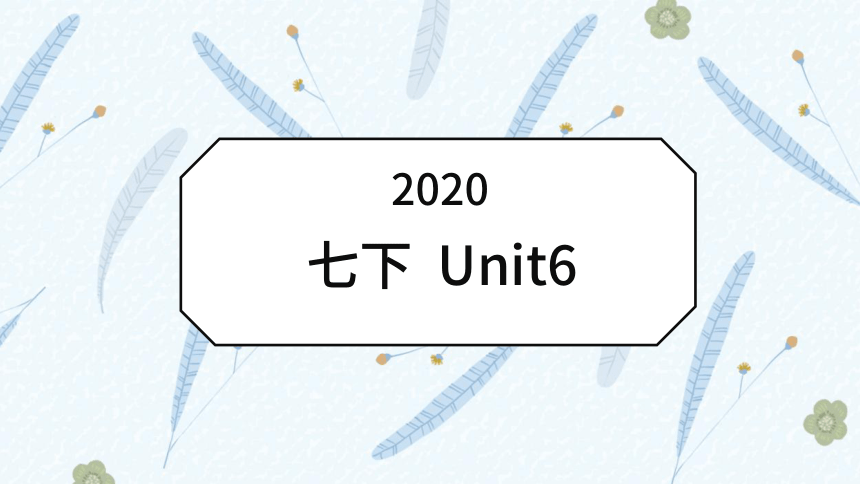
|
|
| 格式 | zip | ||
| 文件大小 | 32.6MB | ||
| 资源类型 | 教案 | ||
| 版本资源 | 牛津上海版(试用本) | ||
| 科目 | 英语 | ||
| 更新时间 | 2020-05-02 08:12:52 | ||
图片预览

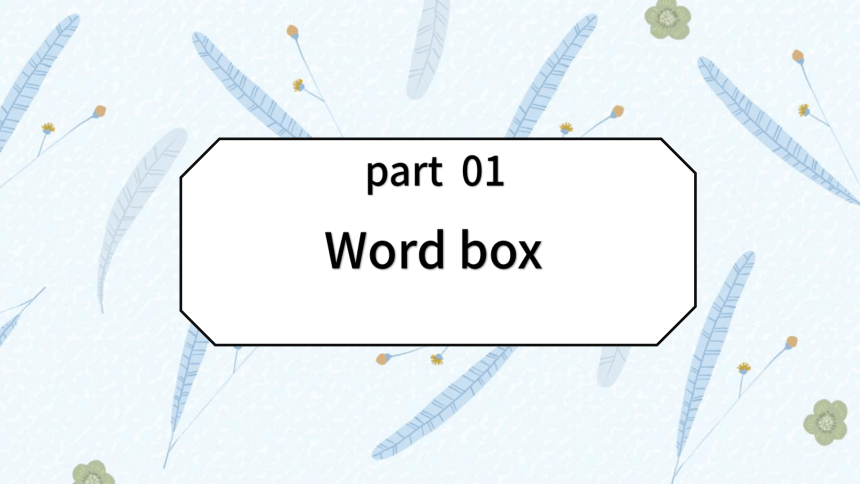

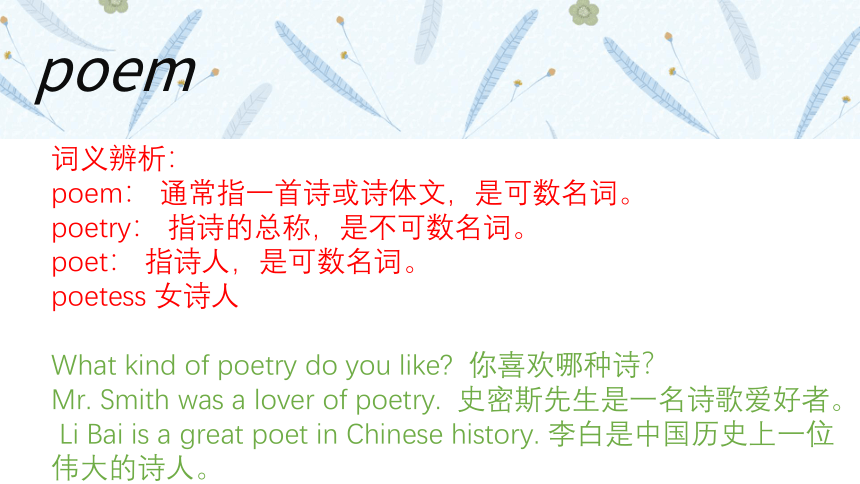

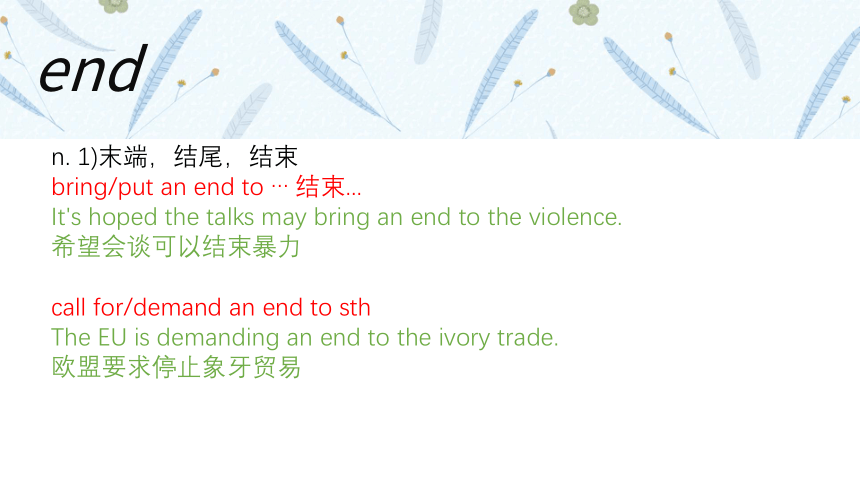
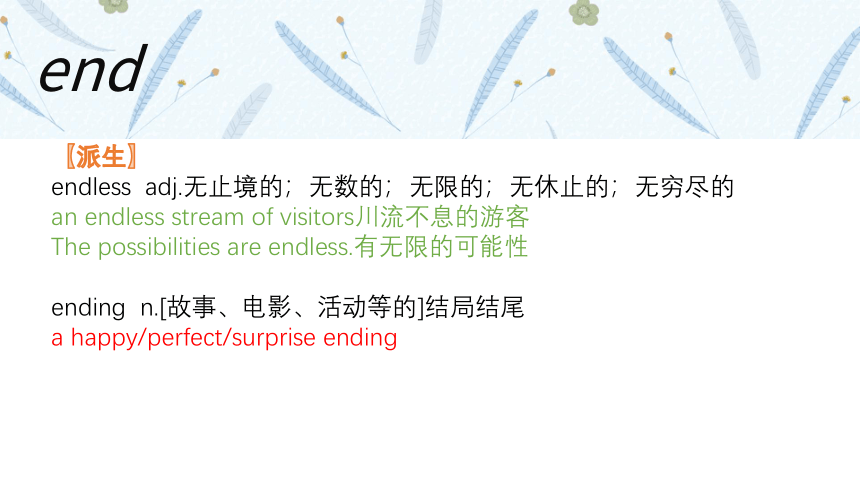
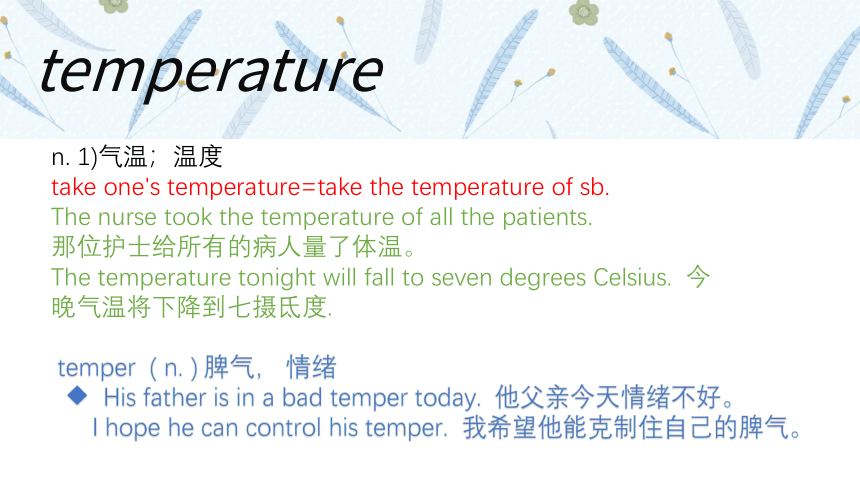
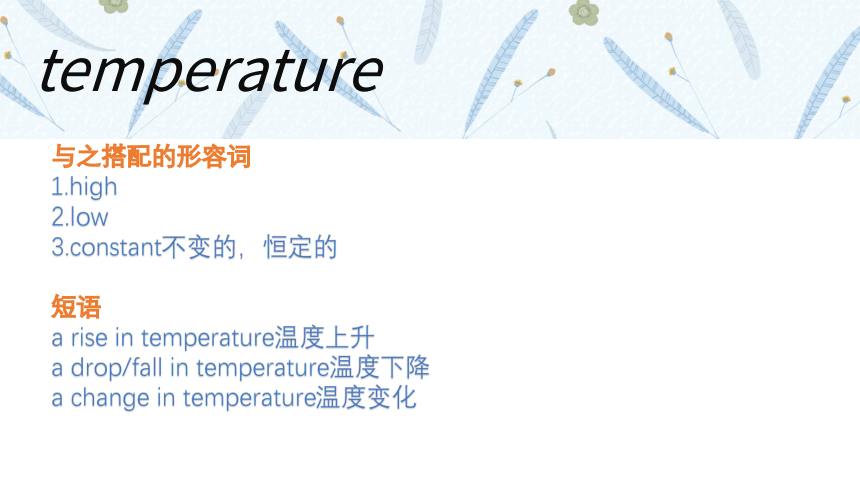
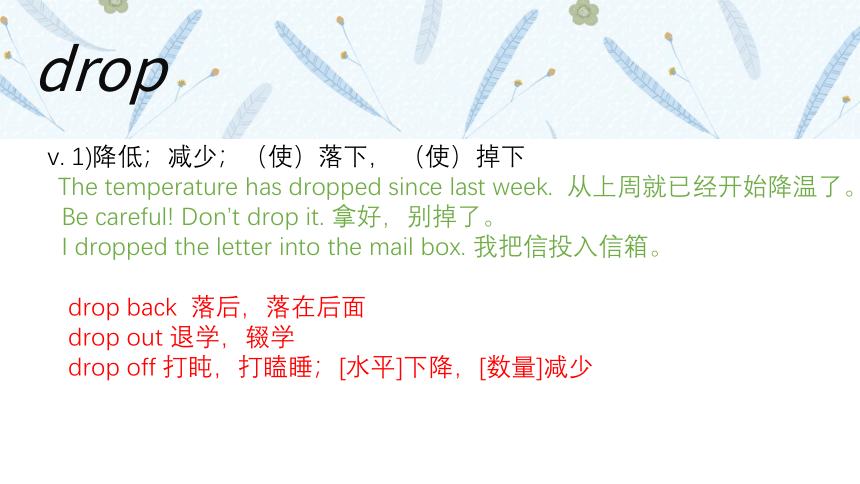

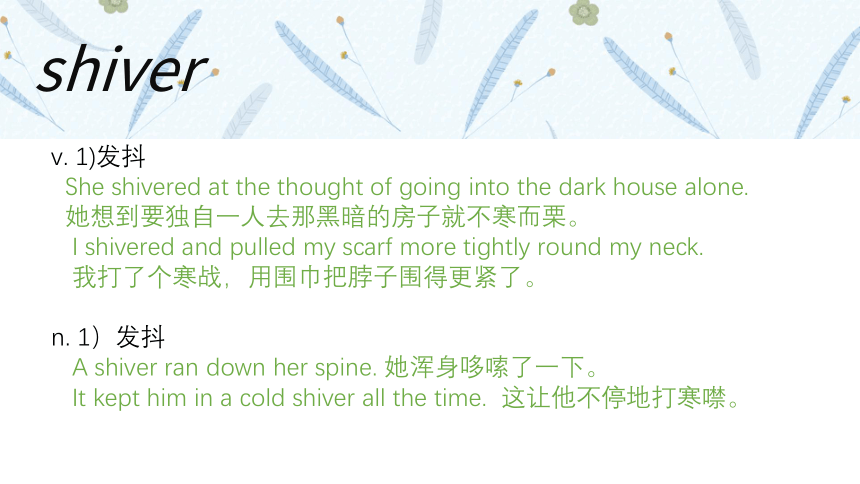
文档简介
(共46张PPT)
七下 Unit6
2020
Word box
part 01
poem
n. 1)诗,韵文,散文
an English poem 一首英文诗
He wrote some poems in English. 他用英语写了几首诗。
He wrote a poem about spring. 他写了一篇关于春天的诗。
【派生】
poetic a.诗的,诗歌特有的;富有诗意的;表达优雅的;诗一般的
poetic expression诗歌的表达方式
poetic language富有诗意的语言
poem
词义辨析:
poem: 通常指一首诗或诗体文,是可数名词。
poetry: 指诗的总称,是不可数名词。
poet: 指诗人,是可数名词。
poetess 女诗人
What kind of poetry do you like? 你喜欢哪种诗?
Mr. Smith was a lover of poetry. 史密斯先生是一名诗歌爱好者。
Li Bai is a great poet in Chinese history. 李白是中国历史上一位伟大的诗人。
end
v. 1)结束
They ended the party with a song. 他们以一首歌结束了聚会。4
n. 1)末端,结尾,结束
How does the story end? 这个故事结局如何?
Now I want to know about this thing from beginning to end.
我现在想源源本本地了解此事。
at the end of … 在…的末端;在…的结束
At the end of the film, the hero cried sadly. 在影片的结尾,主人公伤心地哭了。
There is a shop at the end of the street. 这条街走到头有一个商店。
end
n. 1)末端,结尾,结束
bring/put an end to … 结束...
It's hoped the talks may bring an end to the violence.
希望会谈可以结束暴力
call for/demand an end to sth
The EU is demanding an end to the ivory trade.
欧盟要求停止象牙贸易
end
【派生】
endless adj.无止境的;无数的;无限的;无休止的;无穷尽的
an endless stream of visitors川流不息的游客
The possibilities are endless.有无限的可能性
ending n.[故事、电影、活动等的]结局结尾
a happy/perfect/surprise ending
temperature
n. 1)气温;温度
take one's temperature=take the temperature of sb.
The nurse took the temperature of all the patients.
那位护士给所有的病人量了体温。
The temperature tonight will fall to seven degrees Celsius. 今
晚气温将下降到七摄氐度.
temper ( n. ) 脾气, 情绪
◆ His father is in a bad temper today. 他父亲今天情绪不好。
I hope he can control his temper. 我希望他能克制住自己的脾气。
temperature
与之搭配的形容词
1.high
2.low
3.constant不变的,恒定的
短语
a rise in temperature温度上升
a drop/fall in temperature温度下降
a change in temperature温度变化
drop
v. 1)降低;减少;(使)落下, (使)掉下
The temperature has dropped since last week. 从上周就已经开始降温了。
Be careful! Don’t drop it. 拿好,别掉了。
I dropped the letter into the mail box. 我把信投入信箱。
drop back 落后,落在后面
drop out 退学,辍学
drop off 打盹,打瞌睡;[水平]下降,[数量]减少
drop
n. 1)滴;水滴
The rain was leaking in large drops through the roof.
雨正大滴大滴地从屋顶上漏下来。
Another drop of water fell with a soft plop.
又一滴水嘀嗒一声落下。
shiver
v. 1)发抖
She shivered at the thought of going into the dark house alone.
她想到要独自一人去那黑暗的房子就不寒而栗。
I shivered and pulled my scarf more tightly round my neck.
我打了个寒战,用围巾把脖子围得更紧了。
n. 1)发抖
A shiver ran down her spine. 她浑身哆嗦了一下。
It kept him in a cold shiver all the time. 这让他不停地打寒噤。
awful
a. 1)糟糕的;极讨厌的
What awful weather! We have to stay at home.
多糟糕的天气,我们只得呆在家里。
We had an awful earthquake here last year.
去年我们这里发生了一次可怕的地震。
【派生】awfully
adv. 1)可怕地,糟糕地;非常[=very]
That man acted awfully.
那个男子演技很差。
It's awfully cold in here.
这儿非常冷。
lazy
a. 1)懒惰的
【派生】
laziness n[U].懒惰
lazily adv.懒惰地
disappointed
a. 1)失望的,沮丧的
We are disappointed that you will not be able to come.
你不能来,我们很失望。
We were disappointed at the results. 我们对结果感到失望。
【派生】
1.disappointing a. 令人失望的
The performance is disappointing.
这场演出令人失望。
The wine was excellent, but the food was disappointing.
酒棒极了,但是饭菜却让人不敢恭维。
disappointed
【派生】
2.disappoint v. 使失望,使沮丧
The film disappointed them. 这部电影令他们很失望。
I’m sorry to disappoint your hope. 对不起,我使你失望了。
3.disappointment n. 失望,令人失望的人或者物
To his disappointment, all the tickets have been sold out.
让他失望的是,所有的票都卖完了。
She couldn’t hide her disappointment. 她无法掩饰自己失望的情绪。
sadly
adv. 1)伤心地
He shook his head sadly. 他伤心地摇了摇头。
Sadly, we could only stay there for three weeks. 令人遗憾的是,我们只能在那儿呆三周。
【派生】
sadness ( n. ) 悲哀,悲伤,忧愁
There was some sadness in her voice. 她的声音中带有几分伤感。
The jokes were a mask to hide his sadness. 玩笑是掩盖他内心悲伤的方式。
Text
part 02
1.season n. 季节→seasonal a. 季节的
2.four seasons:
spring,summer,autumn(fall),winter
have fun = have a good time = enjoy oneself 玩得开心,过得愉快
注意:fun 是名词,表示“有趣的事”。
◆ You will be sure to have fun at the party.
今晚的聚会上,你一定会玩得很开心。
What fun we have! (注意感叹句的用法)
The holidays are coming. 假期就要来了。
The holidays are ending. 假期就要结束了。
用现在进行时表将来。现在进行时除了描述正在发生的动作之外,还常常用来描述即将发生的事情。
1)--- Where are Kitty and Alice?
--- They are playing tennis in the park. (表示正在发生的事情)
2)Ben is seeing the dentist on Friday. (表示对将来的安排或计划)
make somebody do something 表示“使/让某人做某事,make 意为“促使;使得”。
◆ The cool weather makes me feel comfortable. 凉爽的天气使我感到舒适。
My boss makes me work 12 hours a day. 我的老板每天让我工作12个小时。
think of 意为“想到,想起;认为...怎么样”。
◆ I think of my hometown when I saw the beautiful scenery. 看见这美丽的景色,我想起我的家乡。
What does the photograph make you think of ? 这张照片让你想起了什么?
I can’t think of his name at the moment. 我一时想不起他的名字。
[请辨析]think of, think about, think over
[请辨析]think of, think about, think over
think of 意为“想到,想起;认为...怎么样”。
◆ I think of my hometown when I saw the beautiful scenery. 看见这美丽的景色,我想起我的家乡。
What does the photograph make you think of ? 这张照片让你想起了什么?
I can’t think of his name at the moment. 我一时想不起他的名字。
think about 意为“考虑;对...有某种看法”。
◆ They are thinking about buying a new car. 他们正在考虑买一辆新车。
What do you think about the TV play? 你认为这部电视剧怎么样?
think over 意为“仔细思考”。
◆ We need several days to think over this matter. 我们需要几天时间仔细考虑这件事。
Think over the matter and then make a decision. 这件事情斟酌斟酌再定。
此句是用it 作形式主语的句子
真正的主语是to walk in wet and dirty streets.
It is + adj. (for sb.) + to do sth. 意为“做某事怎么样”
◆ It is necessary to have an air-conditioned classroom in our school. 学校需要一间有空调的教室。
It is dangerous to play in the street. 在街上玩耍很危险。
1)see somebody do something
表示“看见某人做某事,强调动作的全过程”。
2)see somebody doing something
表示“看见某人正在做某事,强调动作正在进行”。
◆I saw him enter into the classroom. 我看看他进入了教室。
I saw him singing in the classroom. 我看见他正在教室唱歌。
all summer:整个夏天。
all 后面加一段时间的名词常常作为句子的时间状语。
◆I did my homework all evening. 我一晚上都在做家庭作业。
Her work chained her to her desk all day. 工作使她整天离不开办公桌。
in the sun 表示“在太阳底下,在阳光下”,
不可以说“under the sun”。
◆The leaves become dry in the sun.
叶子在骄阳下都干了。
The wet clothes will soon dry in the sun.
湿衣服在太阳下很快就会干的。
Would you please take the suitcase into my room for me?
注意 take 的用法:
(1) 拿;取 I want to take some books to the classroom.
(2) 吃;喝;服用 Take this medicine three times a day.
(3) 乘车(船) They usually take a bus to work.
(4) 花费(时间,金钱) How long will it take you to do your homework every day?
(5) 做...事情
take a walk; take a rest; take a look; take away; take care;
take good care of; take down; take out; take off
There will be plenty of food in the forest in winter.
这是 there be 句型的一般将来时用法。
there be 句型常见于一般现在时、一般过去时、一般将来时和现在完成时中。
◆There is a train every hour.
(时态:________________ )
There was a good film on TV last night.
(时态:________________ )
This road is very dangerous. There have been many accidents.
(时态:________________ )
I’m going away tomorrow. I’ll do my packing today because there won’t be time tomorrow.
(时态:________________ )
系动词 + 形容词 (系表结构)
◆ It smells good.
The boy looks sad.
The price sounds reasonable.
Silk feels smooth.
What’s the matter
= What’s wrong with you?
= What’s the trouble with you?
= What’s the problem?
= What’s troubling you?
Exercises
part 03
I. Choose the best answer.
( ) 1. There is ____________ international food festival at our school.
A. a B. an C. the D. /
( ) 2. The little girl couldn’t find her mother. We helped ____________ find her mother at last.
A. she B. her C. hers D. herself
( ) 3. Please read the ____________ carefully before you use the computer.
A. invitation B. information C. instruction D. warning
( ) 4. We always have an examination ____________ each term.
A. at the end of B. in the end C. by the end of D. end of
( ) 5. ____________ pity it is! You didn’t pass the exam again.
A. What B. What a C. What an D. How
I. Choose the best answer.
( ) 1. There is ____________ international food festival at our school.
A. a B. an C. the D. /
( ) 2. The little girl couldn’t find her mother. We helped ____________ find her mother at last.
A. she B. her C. hers D. herself
( ) 3. Please read the ____________ carefully before you use the computer.
A. invitation B. information C. instruction D. warning
( ) 4. We always have an examination ____________ each term.
A. at the end of B. in the end C. by the end of D. end of
( ) 5. ____________ pity it is! You didn’t pass the exam again.
A. What B. What a C. What an D. How
( ) 6. ____________ people visit the Great Wall every year.
A. Thousands of B. Thousand C. Thousands D. Thousand of
( ) 7. Our school has a lot of students from ____________ countries.
A. another B. others C. the other D. other
( ) 8. We ____________ break the new traffic rules and learn how to protect ourselves.
A. may not B. mustn’t C. can’t D. needn’t
( ) 9. The life in the city is ____________ than that in the countryside.
A. more interesting B. much interesting C. much busy D. more busy
( ) 10. The music played by Lang Lang sounds ____________.
A. wonderfully B. beautiful C. sweetly D. beautifully
( ) 6. ____________ people visit the Great Wall every year.
A. Thousands of B. Thousand C. Thousands D. Thousand of
( ) 7. Our school has a lot of students from ____________ countries.
A. another B. others C. the other D. other
( ) 8. We ____________ break the new traffic rules and learn how to protect ourselves.
A. may not B. mustn’t C. can’t D. needn’t
( ) 9. The life in the city is ____________ than that in the countryside.
A. more interesting B. much interesting C. much busy D. more busy
( ) 10. The music played by Lang Lang sounds ____________.
A. wonderfully B. beautiful C. sweetly D. beautifully
( ) 11. Danny, you are getting fatter and fatter. You mustn’t eat ____________ meat.
A. too many B. too much C. too few D. too little
( ) 12. The new type of ipad in the photo ____________ me about five thousand yuan.
A. took B. spent C. got D. cost
( ) 13. I don’t like that black puppy. I’d rather ____________ the white cat.
A. to have B. having C. has D. have
( ) 14. The students are looking forward to ____________ the Great Wall this weekend.
A. visit B. visits C. visited D. visiting
( ) 15. --- We can use QQ to talk with each other online.
--- Good! Will you please show me ____________ it?
A. what to use B. how to use C. when to use D. where to use
( ) 11. Danny, you are getting fatter and fatter. You mustn’t eat ____________ meat.
A. too many B. too much C. too few D. too little
( ) 12. The new type of ipad in the photo ____________ me about five thousand yuan.
A. took B. spent C. got D. cost
( ) 13. I don’t like that black puppy. I’d rather ____________ the white cat.
A. to have B. having C. has D. have
( ) 14. The students are looking forward to ____________ the Great Wall this weekend.
A. visit B. visits C. visited D. visiting
( ) 15. --- We can use QQ to talk with each other online.
--- Good! Will you please show me ____________ it?
A. what to use B. how to use C. when to use D. where to use
( ) 16. There ____________ a class meeting in our classroom next Monday.
A. is going to have B. going to be C. will have D.will be
( ) 17. There are more than 20 pens in my pocket. The underlined part means “____________”.
A. about B.over C. for D. besides
( ) 18. You must do your homework first, ____________ you can’t go outside.
A.or B. because C. if D. when
( ) 19. --- ____________ was your trip? --- It was wonderful.
A. How long B. How much C. What D.How
( ) 20. --- Shall we go to plant some trees in the park? --- ____________
A. Yes, we shall. B. That’s right. C. That’s all right. C. That’s a good idea
( ) 16. There ____________ a class meeting in our classroom next Monday.
A. is going to have B. going to be C. will have D. will be
( ) 17. There are more than 20 pens in my pocket. The underlined part means “____________”.
A. about B. over C. for D. besides
( ) 18. You must do your homework first, ____________ you can’t go outside.
A. or B. because C. if D. when
( ) 19. --- ____________ was your trip? --- It was wonderful.
A. How long B. How much C. What D. How
( ) 20. --- Shall we go to plant some trees in the park? --- ____________
A. Yes, we shall. B. That’s right. C. That’s all right. D. That’s a good idea.
II. Complete the sentences with the given words in their proper forms.
1.Can you tell me what we usually see on a ____________ day? (wind)
2.It is ____________ to watch such a wonderful 3D movie. (excite)
3.In summer, the sun always shines ____________ in the sky. (bright)
4.Spring makes me think of ____________. (out)
5.Can you tell me the ____________ between these two words? (different)
6.Mike will become much ____________ in ten years’ time. (strong)
7.Little Sam looked ________ at his dad because he failed in the Math exam.(sad)
8.Jane felt ____________ at the result of the football match. (disappointing)
II. Complete the sentences with the given words in their proper forms.
1.Can you tell me what we usually see on a ___windy____ day? (wind)
2.It is __exciting____ to watch such a wonderful 3D movie. (excite)
3.In summer, the sun always shines ___brightly___ in the sky. (bright)
4.Spring makes me think of ____outing(s)____. (out)
5.Can you tell me the _difference(s)__ between these two words? (different)
6.Mike will become much __stronger__ in ten years’ time. (strong)
7.Little Sam looked _sadly_ at his dad because he failed in the Math exam. (sad)
8.Jane felt _disappointed_ at the result of the football match. (disappointing)
III. Complete the sentences with the given verbs in their proper forms.
1.I start ____________ money at the age of fifteen. (save)
2.We should do our best ____________ the sea and the beach. (not pollute)
3.I don’t know the man in black. I ____________ him before. (not meet)
4.When I was young, the teacher told me that the Earth ____________ around the sun. (move)
5.We ____________ the London Bridge two days ago. (visit)
6.Jenny ____________ the novel for three times. (read)
7.It’s awful ____________ on muddy roads.(walk)
8.If you look at the bright side of your life, the sun will never stop ____________ on you. (shine)
III. Complete the sentences with the given verbs in their proper forms.
1.I start ___saving___ money at the age of fifteen. (save)
2.We should do our best __not to pollute__ the sea and the beach. (not pollute)
3.I don’t know the man in black. I __haven't met__ him before. (not meet)
4.When I was young, the teacher told me that the Earth __moves__ around the sun. (move)
5.We __visited__ the London Bridge two days ago. (visit)
6.Jenny __has read___ the novel for three times. (read)
7.It’s awful ___to walk__ on muddy roads.(walk)
8.If you look at the bright side of your life, the sun will never stop __shining__ on you. (shine)
III. Complete the following passage with the words or expressions in the box. Each one can only be used once.
A. awful B. when C. to lie D. boating E. Have a good time F. activities G. flowers H. think of I. amazing
Many people like spring,because they can go out and do many kinds of activities. If people are asked what spring makes them ___1___, guess what they would say. We made a survey about the ___2___ that people like to do in spring. Here are the results. Scott: In spring, I often visit my uncle and I like fishing with him. I also like ___3___ and enjoy the beach. Last spring, my uncle and I went boating. The dolphins came so close to us. It was very ___4___. I hope that I can go there again soon. Linda: My favourite spring activity is gardening. I think it is relaxing to work in the garden. I grow many ___5___ in my garden every year. They are so beautiful. Nancy: I love spring. I love going to the beach and spend a whole day there. It is so relaxing ___6___ on the beach. I also like surfing in the sea. James: I am twelve years old. My favourite spring activity is swimming. I started to learn swimming ___7___ I was seven years old. I always ___8___ with my friends in the river.
II. Complete the following passage with the words or expressions in the box. Each one can only be used once.
A. awful B. when C. to lie D. boating E. Have a good time F. activities G. flowers H. think of I. amazing
Many people like spring,because they can go out and do many kinds of activities. If people are asked what spring makes them ___H___, guess what they would say. We made a survey about the ___F___ that people like to do in spring. Here are the results. Scott: In spring, I often visit my uncle and I like fishing with him. I also like ___D___ and enjoy the beach. Last spring, my uncle and I went boating. The dolphins came so close to us. It was very ___I___. I hope that I can go there again soon. Linda: My favourite spring activity is gardening. I think it is relaxing to work in the garden. I grow many ___G___ in my garden every year. They are so beautiful. Nancy: I love spring. I love going to the beach and spend a whole day there. It is so relaxing ___C___ on the beach. I also like surfing in the sea. James: I am twelve years old. My favourite spring activity is swimming. I started to learn swimming ___B___ I was seven years old. I always ___E___ with my friends in the river.
七下 Unit6
2020
Word box
part 01
poem
n. 1)诗,韵文,散文
an English poem 一首英文诗
He wrote some poems in English. 他用英语写了几首诗。
He wrote a poem about spring. 他写了一篇关于春天的诗。
【派生】
poetic a.诗的,诗歌特有的;富有诗意的;表达优雅的;诗一般的
poetic expression诗歌的表达方式
poetic language富有诗意的语言
poem
词义辨析:
poem: 通常指一首诗或诗体文,是可数名词。
poetry: 指诗的总称,是不可数名词。
poet: 指诗人,是可数名词。
poetess 女诗人
What kind of poetry do you like? 你喜欢哪种诗?
Mr. Smith was a lover of poetry. 史密斯先生是一名诗歌爱好者。
Li Bai is a great poet in Chinese history. 李白是中国历史上一位伟大的诗人。
end
v. 1)结束
They ended the party with a song. 他们以一首歌结束了聚会。4
n. 1)末端,结尾,结束
How does the story end? 这个故事结局如何?
Now I want to know about this thing from beginning to end.
我现在想源源本本地了解此事。
at the end of … 在…的末端;在…的结束
At the end of the film, the hero cried sadly. 在影片的结尾,主人公伤心地哭了。
There is a shop at the end of the street. 这条街走到头有一个商店。
end
n. 1)末端,结尾,结束
bring/put an end to … 结束...
It's hoped the talks may bring an end to the violence.
希望会谈可以结束暴力
call for/demand an end to sth
The EU is demanding an end to the ivory trade.
欧盟要求停止象牙贸易
end
【派生】
endless adj.无止境的;无数的;无限的;无休止的;无穷尽的
an endless stream of visitors川流不息的游客
The possibilities are endless.有无限的可能性
ending n.[故事、电影、活动等的]结局结尾
a happy/perfect/surprise ending
temperature
n. 1)气温;温度
take one's temperature=take the temperature of sb.
The nurse took the temperature of all the patients.
那位护士给所有的病人量了体温。
The temperature tonight will fall to seven degrees Celsius. 今
晚气温将下降到七摄氐度.
temper ( n. ) 脾气, 情绪
◆ His father is in a bad temper today. 他父亲今天情绪不好。
I hope he can control his temper. 我希望他能克制住自己的脾气。
temperature
与之搭配的形容词
1.high
2.low
3.constant不变的,恒定的
短语
a rise in temperature温度上升
a drop/fall in temperature温度下降
a change in temperature温度变化
drop
v. 1)降低;减少;(使)落下, (使)掉下
The temperature has dropped since last week. 从上周就已经开始降温了。
Be careful! Don’t drop it. 拿好,别掉了。
I dropped the letter into the mail box. 我把信投入信箱。
drop back 落后,落在后面
drop out 退学,辍学
drop off 打盹,打瞌睡;[水平]下降,[数量]减少
drop
n. 1)滴;水滴
The rain was leaking in large drops through the roof.
雨正大滴大滴地从屋顶上漏下来。
Another drop of water fell with a soft plop.
又一滴水嘀嗒一声落下。
shiver
v. 1)发抖
She shivered at the thought of going into the dark house alone.
她想到要独自一人去那黑暗的房子就不寒而栗。
I shivered and pulled my scarf more tightly round my neck.
我打了个寒战,用围巾把脖子围得更紧了。
n. 1)发抖
A shiver ran down her spine. 她浑身哆嗦了一下。
It kept him in a cold shiver all the time. 这让他不停地打寒噤。
awful
a. 1)糟糕的;极讨厌的
What awful weather! We have to stay at home.
多糟糕的天气,我们只得呆在家里。
We had an awful earthquake here last year.
去年我们这里发生了一次可怕的地震。
【派生】awfully
adv. 1)可怕地,糟糕地;非常[=very]
That man acted awfully.
那个男子演技很差。
It's awfully cold in here.
这儿非常冷。
lazy
a. 1)懒惰的
【派生】
laziness n[U].懒惰
lazily adv.懒惰地
disappointed
a. 1)失望的,沮丧的
We are disappointed that you will not be able to come.
你不能来,我们很失望。
We were disappointed at the results. 我们对结果感到失望。
【派生】
1.disappointing a. 令人失望的
The performance is disappointing.
这场演出令人失望。
The wine was excellent, but the food was disappointing.
酒棒极了,但是饭菜却让人不敢恭维。
disappointed
【派生】
2.disappoint v. 使失望,使沮丧
The film disappointed them. 这部电影令他们很失望。
I’m sorry to disappoint your hope. 对不起,我使你失望了。
3.disappointment n. 失望,令人失望的人或者物
To his disappointment, all the tickets have been sold out.
让他失望的是,所有的票都卖完了。
She couldn’t hide her disappointment. 她无法掩饰自己失望的情绪。
sadly
adv. 1)伤心地
He shook his head sadly. 他伤心地摇了摇头。
Sadly, we could only stay there for three weeks. 令人遗憾的是,我们只能在那儿呆三周。
【派生】
sadness ( n. ) 悲哀,悲伤,忧愁
There was some sadness in her voice. 她的声音中带有几分伤感。
The jokes were a mask to hide his sadness. 玩笑是掩盖他内心悲伤的方式。
Text
part 02
1.season n. 季节→seasonal a. 季节的
2.four seasons:
spring,summer,autumn(fall),winter
have fun = have a good time = enjoy oneself 玩得开心,过得愉快
注意:fun 是名词,表示“有趣的事”。
◆ You will be sure to have fun at the party.
今晚的聚会上,你一定会玩得很开心。
What fun we have! (注意感叹句的用法)
The holidays are coming. 假期就要来了。
The holidays are ending. 假期就要结束了。
用现在进行时表将来。现在进行时除了描述正在发生的动作之外,还常常用来描述即将发生的事情。
1)--- Where are Kitty and Alice?
--- They are playing tennis in the park. (表示正在发生的事情)
2)Ben is seeing the dentist on Friday. (表示对将来的安排或计划)
make somebody do something 表示“使/让某人做某事,make 意为“促使;使得”。
◆ The cool weather makes me feel comfortable. 凉爽的天气使我感到舒适。
My boss makes me work 12 hours a day. 我的老板每天让我工作12个小时。
think of 意为“想到,想起;认为...怎么样”。
◆ I think of my hometown when I saw the beautiful scenery. 看见这美丽的景色,我想起我的家乡。
What does the photograph make you think of ? 这张照片让你想起了什么?
I can’t think of his name at the moment. 我一时想不起他的名字。
[请辨析]think of, think about, think over
[请辨析]think of, think about, think over
think of 意为“想到,想起;认为...怎么样”。
◆ I think of my hometown when I saw the beautiful scenery. 看见这美丽的景色,我想起我的家乡。
What does the photograph make you think of ? 这张照片让你想起了什么?
I can’t think of his name at the moment. 我一时想不起他的名字。
think about 意为“考虑;对...有某种看法”。
◆ They are thinking about buying a new car. 他们正在考虑买一辆新车。
What do you think about the TV play? 你认为这部电视剧怎么样?
think over 意为“仔细思考”。
◆ We need several days to think over this matter. 我们需要几天时间仔细考虑这件事。
Think over the matter and then make a decision. 这件事情斟酌斟酌再定。
此句是用it 作形式主语的句子
真正的主语是to walk in wet and dirty streets.
It is + adj. (for sb.) + to do sth. 意为“做某事怎么样”
◆ It is necessary to have an air-conditioned classroom in our school. 学校需要一间有空调的教室。
It is dangerous to play in the street. 在街上玩耍很危险。
1)see somebody do something
表示“看见某人做某事,强调动作的全过程”。
2)see somebody doing something
表示“看见某人正在做某事,强调动作正在进行”。
◆I saw him enter into the classroom. 我看看他进入了教室。
I saw him singing in the classroom. 我看见他正在教室唱歌。
all summer:整个夏天。
all 后面加一段时间的名词常常作为句子的时间状语。
◆I did my homework all evening. 我一晚上都在做家庭作业。
Her work chained her to her desk all day. 工作使她整天离不开办公桌。
in the sun 表示“在太阳底下,在阳光下”,
不可以说“under the sun”。
◆The leaves become dry in the sun.
叶子在骄阳下都干了。
The wet clothes will soon dry in the sun.
湿衣服在太阳下很快就会干的。
Would you please take the suitcase into my room for me?
注意 take 的用法:
(1) 拿;取 I want to take some books to the classroom.
(2) 吃;喝;服用 Take this medicine three times a day.
(3) 乘车(船) They usually take a bus to work.
(4) 花费(时间,金钱) How long will it take you to do your homework every day?
(5) 做...事情
take a walk; take a rest; take a look; take away; take care;
take good care of; take down; take out; take off
There will be plenty of food in the forest in winter.
这是 there be 句型的一般将来时用法。
there be 句型常见于一般现在时、一般过去时、一般将来时和现在完成时中。
◆There is a train every hour.
(时态:________________ )
There was a good film on TV last night.
(时态:________________ )
This road is very dangerous. There have been many accidents.
(时态:________________ )
I’m going away tomorrow. I’ll do my packing today because there won’t be time tomorrow.
(时态:________________ )
系动词 + 形容词 (系表结构)
◆ It smells good.
The boy looks sad.
The price sounds reasonable.
Silk feels smooth.
What’s the matter
= What’s wrong with you?
= What’s the trouble with you?
= What’s the problem?
= What’s troubling you?
Exercises
part 03
I. Choose the best answer.
( ) 1. There is ____________ international food festival at our school.
A. a B. an C. the D. /
( ) 2. The little girl couldn’t find her mother. We helped ____________ find her mother at last.
A. she B. her C. hers D. herself
( ) 3. Please read the ____________ carefully before you use the computer.
A. invitation B. information C. instruction D. warning
( ) 4. We always have an examination ____________ each term.
A. at the end of B. in the end C. by the end of D. end of
( ) 5. ____________ pity it is! You didn’t pass the exam again.
A. What B. What a C. What an D. How
I. Choose the best answer.
( ) 1. There is ____________ international food festival at our school.
A. a B. an C. the D. /
( ) 2. The little girl couldn’t find her mother. We helped ____________ find her mother at last.
A. she B. her C. hers D. herself
( ) 3. Please read the ____________ carefully before you use the computer.
A. invitation B. information C. instruction D. warning
( ) 4. We always have an examination ____________ each term.
A. at the end of B. in the end C. by the end of D. end of
( ) 5. ____________ pity it is! You didn’t pass the exam again.
A. What B. What a C. What an D. How
( ) 6. ____________ people visit the Great Wall every year.
A. Thousands of B. Thousand C. Thousands D. Thousand of
( ) 7. Our school has a lot of students from ____________ countries.
A. another B. others C. the other D. other
( ) 8. We ____________ break the new traffic rules and learn how to protect ourselves.
A. may not B. mustn’t C. can’t D. needn’t
( ) 9. The life in the city is ____________ than that in the countryside.
A. more interesting B. much interesting C. much busy D. more busy
( ) 10. The music played by Lang Lang sounds ____________.
A. wonderfully B. beautiful C. sweetly D. beautifully
( ) 6. ____________ people visit the Great Wall every year.
A. Thousands of B. Thousand C. Thousands D. Thousand of
( ) 7. Our school has a lot of students from ____________ countries.
A. another B. others C. the other D. other
( ) 8. We ____________ break the new traffic rules and learn how to protect ourselves.
A. may not B. mustn’t C. can’t D. needn’t
( ) 9. The life in the city is ____________ than that in the countryside.
A. more interesting B. much interesting C. much busy D. more busy
( ) 10. The music played by Lang Lang sounds ____________.
A. wonderfully B. beautiful C. sweetly D. beautifully
( ) 11. Danny, you are getting fatter and fatter. You mustn’t eat ____________ meat.
A. too many B. too much C. too few D. too little
( ) 12. The new type of ipad in the photo ____________ me about five thousand yuan.
A. took B. spent C. got D. cost
( ) 13. I don’t like that black puppy. I’d rather ____________ the white cat.
A. to have B. having C. has D. have
( ) 14. The students are looking forward to ____________ the Great Wall this weekend.
A. visit B. visits C. visited D. visiting
( ) 15. --- We can use QQ to talk with each other online.
--- Good! Will you please show me ____________ it?
A. what to use B. how to use C. when to use D. where to use
( ) 11. Danny, you are getting fatter and fatter. You mustn’t eat ____________ meat.
A. too many B. too much C. too few D. too little
( ) 12. The new type of ipad in the photo ____________ me about five thousand yuan.
A. took B. spent C. got D. cost
( ) 13. I don’t like that black puppy. I’d rather ____________ the white cat.
A. to have B. having C. has D. have
( ) 14. The students are looking forward to ____________ the Great Wall this weekend.
A. visit B. visits C. visited D. visiting
( ) 15. --- We can use QQ to talk with each other online.
--- Good! Will you please show me ____________ it?
A. what to use B. how to use C. when to use D. where to use
( ) 16. There ____________ a class meeting in our classroom next Monday.
A. is going to have B. going to be C. will have D.will be
( ) 17. There are more than 20 pens in my pocket. The underlined part means “____________”.
A. about B.over C. for D. besides
( ) 18. You must do your homework first, ____________ you can’t go outside.
A.or B. because C. if D. when
( ) 19. --- ____________ was your trip? --- It was wonderful.
A. How long B. How much C. What D.How
( ) 20. --- Shall we go to plant some trees in the park? --- ____________
A. Yes, we shall. B. That’s right. C. That’s all right. C. That’s a good idea
( ) 16. There ____________ a class meeting in our classroom next Monday.
A. is going to have B. going to be C. will have D. will be
( ) 17. There are more than 20 pens in my pocket. The underlined part means “____________”.
A. about B. over C. for D. besides
( ) 18. You must do your homework first, ____________ you can’t go outside.
A. or B. because C. if D. when
( ) 19. --- ____________ was your trip? --- It was wonderful.
A. How long B. How much C. What D. How
( ) 20. --- Shall we go to plant some trees in the park? --- ____________
A. Yes, we shall. B. That’s right. C. That’s all right. D. That’s a good idea.
II. Complete the sentences with the given words in their proper forms.
1.Can you tell me what we usually see on a ____________ day? (wind)
2.It is ____________ to watch such a wonderful 3D movie. (excite)
3.In summer, the sun always shines ____________ in the sky. (bright)
4.Spring makes me think of ____________. (out)
5.Can you tell me the ____________ between these two words? (different)
6.Mike will become much ____________ in ten years’ time. (strong)
7.Little Sam looked ________ at his dad because he failed in the Math exam.(sad)
8.Jane felt ____________ at the result of the football match. (disappointing)
II. Complete the sentences with the given words in their proper forms.
1.Can you tell me what we usually see on a ___windy____ day? (wind)
2.It is __exciting____ to watch such a wonderful 3D movie. (excite)
3.In summer, the sun always shines ___brightly___ in the sky. (bright)
4.Spring makes me think of ____outing(s)____. (out)
5.Can you tell me the _difference(s)__ between these two words? (different)
6.Mike will become much __stronger__ in ten years’ time. (strong)
7.Little Sam looked _sadly_ at his dad because he failed in the Math exam. (sad)
8.Jane felt _disappointed_ at the result of the football match. (disappointing)
III. Complete the sentences with the given verbs in their proper forms.
1.I start ____________ money at the age of fifteen. (save)
2.We should do our best ____________ the sea and the beach. (not pollute)
3.I don’t know the man in black. I ____________ him before. (not meet)
4.When I was young, the teacher told me that the Earth ____________ around the sun. (move)
5.We ____________ the London Bridge two days ago. (visit)
6.Jenny ____________ the novel for three times. (read)
7.It’s awful ____________ on muddy roads.(walk)
8.If you look at the bright side of your life, the sun will never stop ____________ on you. (shine)
III. Complete the sentences with the given verbs in their proper forms.
1.I start ___saving___ money at the age of fifteen. (save)
2.We should do our best __not to pollute__ the sea and the beach. (not pollute)
3.I don’t know the man in black. I __haven't met__ him before. (not meet)
4.When I was young, the teacher told me that the Earth __moves__ around the sun. (move)
5.We __visited__ the London Bridge two days ago. (visit)
6.Jenny __has read___ the novel for three times. (read)
7.It’s awful ___to walk__ on muddy roads.(walk)
8.If you look at the bright side of your life, the sun will never stop __shining__ on you. (shine)
III. Complete the following passage with the words or expressions in the box. Each one can only be used once.
A. awful B. when C. to lie D. boating E. Have a good time F. activities G. flowers H. think of I. amazing
Many people like spring,because they can go out and do many kinds of activities. If people are asked what spring makes them ___1___, guess what they would say. We made a survey about the ___2___ that people like to do in spring. Here are the results. Scott: In spring, I often visit my uncle and I like fishing with him. I also like ___3___ and enjoy the beach. Last spring, my uncle and I went boating. The dolphins came so close to us. It was very ___4___. I hope that I can go there again soon. Linda: My favourite spring activity is gardening. I think it is relaxing to work in the garden. I grow many ___5___ in my garden every year. They are so beautiful. Nancy: I love spring. I love going to the beach and spend a whole day there. It is so relaxing ___6___ on the beach. I also like surfing in the sea. James: I am twelve years old. My favourite spring activity is swimming. I started to learn swimming ___7___ I was seven years old. I always ___8___ with my friends in the river.
II. Complete the following passage with the words or expressions in the box. Each one can only be used once.
A. awful B. when C. to lie D. boating E. Have a good time F. activities G. flowers H. think of I. amazing
Many people like spring,because they can go out and do many kinds of activities. If people are asked what spring makes them ___H___, guess what they would say. We made a survey about the ___F___ that people like to do in spring. Here are the results. Scott: In spring, I often visit my uncle and I like fishing with him. I also like ___D___ and enjoy the beach. Last spring, my uncle and I went boating. The dolphins came so close to us. It was very ___I___. I hope that I can go there again soon. Linda: My favourite spring activity is gardening. I think it is relaxing to work in the garden. I grow many ___G___ in my garden every year. They are so beautiful. Nancy: I love spring. I love going to the beach and spend a whole day there. It is so relaxing ___C___ on the beach. I also like surfing in the sea. James: I am twelve years old. My favourite spring activity is swimming. I started to learn swimming ___B___ I was seven years old. I always ___E___ with my friends in the river.
同课章节目录
- Module 1 Garden City and its neighbours
- Unit 1 Writing a travel guide
- Unit 2 Going to see a film
- Unit 3 A visit to Garden City
- Module 2 Better future
- Unit 4 Let's go shopping
- Unit 5 What can we learn from others?
- Unit 6 Hard work for a better life
- Unit 7 in the future
- Module 3 The natural elements
- Unit 8 A more enjoyable school life
- Unit 9 The wind is blowing
- Unit 10 Water Festival
- Unit 11 Electricity
